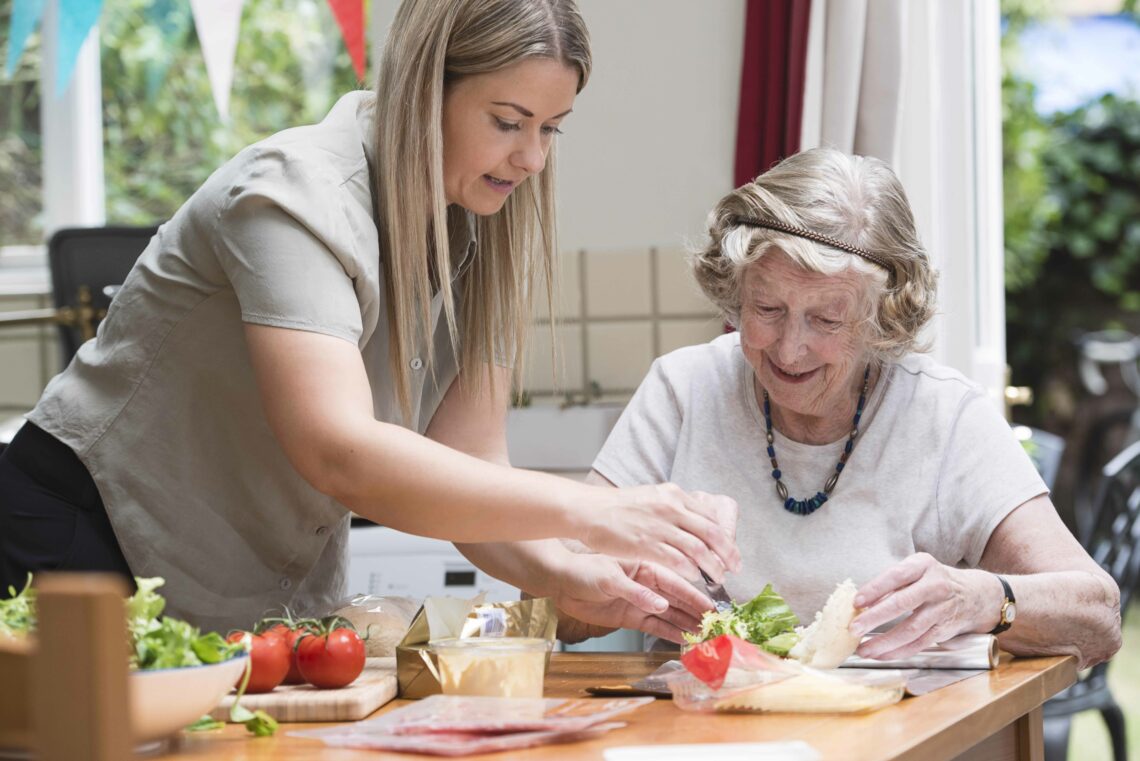It’s easy to pay attention to the obvious signs of ageing – frailty, memory problems, mobility issues leading to trips and falls.
Less obvious but equally important is nutrition, and it can sometimes be the last thing we think of. Especially given that 5.4 million people in the UK are unpaid caregivers – often a spouse or children of an elderly loved one – it’s important to know the facts around elderly nutrition requirements.
In this article we share 8 simple elderly nutrition tips, to help you keep your loved one happy and healthy.
Why Is Nutrition So Important to Ageing?
Eating well is important at any age, but as we get older our diet can play a critical role in maintaining health.
Our dietary requirements change as we get older. At the same time, many older people suffer from a loss of appetite, making getting the required nutrients more difficult. Older people should eat a nutrient-rich diet, in order to maximise the value of what they do eat.
Nutrient or vitamin deficiencies can cause a wide range of health complications that are better off avoided. In fact, poor nutrition costs the NHS over £6 billion each year, causing nearly 3 million avoidable deaths annually.
8 Elderly Nutrition Tips:
1.Pack In The Protein
Protein is critical to forming muscle. Given that age-related muscle loss speeds up after 60, not getting enough protein can have a massively detrimental health impact.
It’s recommended that older people eat double the amount of protein, in order to counteract this muscle loss (sarcopenia, by its medical name).
2. Eat 5 A Day, And Then Some
Five is the absolute minimum number of fruit and vegetables you should be eating…. Something that 70% of adults aged over 65 fail to do. By way of comparison, Japan advises citizens eat no less than 17 portions a day.
Aim for a rainbow spread – the more colours on your plate, the more varied the nutrients you’re getting.

3. Get Enough Calcium
Calcium is, as you probably know, critical to bone health. What you might not know is that we naturally absorb less calcium as we age, so getting enough is a critical part of elder care.
4. Consider A B-12 Supplement
B-12 deficiency, otherwise known as Folate, is common amongst older people. You find this vitamin in food such as meat, dairy or eggs, or many people recommend older adults take a supplement to aid absorption by the body.
5. Eat Vitamin D Enriched Foods
Vitamin D deficiency is one of the most common problems older people have, and can exacerbate a long list of conditions.
Oily fish – salmon, mackerel, sardines, trout, for example – are all naturally high in Vitamin D, but if your appetite is minimal (or you don’t like fish) you could consider specially enriched foods.
6. Eat Iron Rich Foods
It’s critical to effectively monitor iron intake as part of your elder care routine. Too much iron can cause stomach problems, too little can cause anaemia.
Mostly, experts recommend that you don’t take an iron supplement because of the side effects of taking too much. Instead, you need to focus on packing iron-rich foods into your daily diet, such as dark leafy vegetables, dried fruit or poultry.
7. Cut Out Sugar and Salt
You don’t need to cut out salt completely, but excessive salt intake can cause a long list of problems, especially in older adults. Salt sensitivity actually increases with age too, so this is one to limit in you or your loved one’s diet as much as possible.
The same applies to sugar – you don’t have to avoid it completely but every step you can take to minimising your intake is a good thing.
Sugar intake can cause a number of problems, from diabetes to kidney disease. Sugar damages your skin too, making you look older more quickly.
8. Drink More Water, And Less Alcohol
Feeling thirsty is how our body tells us we need to drink, but this mechanism decreases as we age. This means elderly adults are more likely to be dehydrated without realising it, which can have some serious knock-on health effects.
It goes almost without saying that the flipside of this is that you should limit your alcohol intake. A recent study found that 1 in 5 adults aged 65+ are drinking an unsafe amount of alcohol – which can take years off your lifespan.
Many things are outside our control – the progression of time sadly being one of them – but getting a good diet is a simple way to stay happier and healthier.
When most people think of elder care, they probably think of more intensive forms of care and nutrition can tend to fall by the wayside a little.
Getting the right diet is absolutely critical though, and it’s an aspect of elder care we really can’t afford to ignore.





